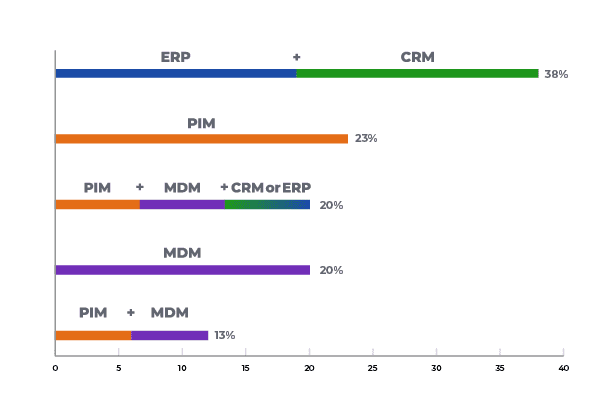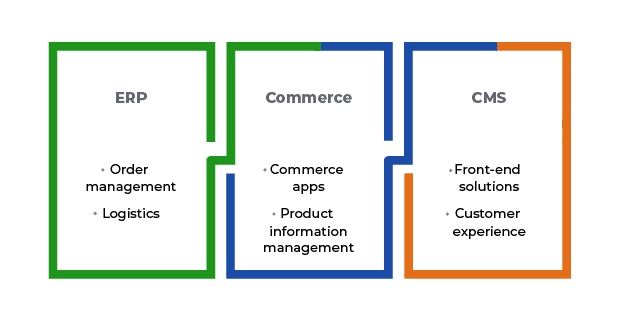
For many sales companies, Enterprise Resource Planning software is an important part of the IT ecosystem, providing data to crucial business systems, such as CRM or OMS.
According to Statista, in Norway alone, the ERP market is expected to amount to approximately 212.2 million U.S. Dollars by 2021.
The extent to which ERP is used as a source system for product master data varies greatly, though.

What is Enterprise Resource Planning?
Let’s begin with the definition.
What is Enterprise Resource Planning (ERP), what does it do, and what do businesses use such a platform for?
Have a look at this summary from Shopify:
An ERP system can take orders from customers, manage financial records, update inventory after each sale, and anticipate labor needs based on the level of orders received. In addition to managing processes, ERP systems also gather, store, and analyze data from internal functions, such as marketing, manufacturing, accounting, facilities, and research and development.
Overview of ERP platforms
The most popular ERP systems include SAP, Infor M3, Visma, Dynamics NAV, MS Dynamics AX, Jeeves, IBX, Driw, and IFS. There are also numerous smaller ERP vendors.
Ironically, the common denominator for all these systems is – they don’t have much in common.
That is why a general plugin directly connecting to any ERP system cannot be created. All ERPs are unique in the way how data is imported and exported from ERP to PIM, even per customer.
That said, integration types usually involve:
- API
- Files by FTP
- Webservice (request or response)
- SOAP
- SAP RFC (remote function call)
PIM or ERP for master data?
ERP gathers raw data from multiple sources like suppliers or third-party data sources, but such tools tend to have low efficiency and reliability in enriching products for digital commerce.
They don’t allow introducing certain quality requirements forced on suppliers’ data, which results in a lot of 'dirty data' placed in ERPs.
An ERP platform, which is often the basis for information fed to an online store, from the marketing perspective produces low-quality product content, for example in product names.
The consequence of it is that product enrichment teams need to spend a substantial amount of time cleaning up the data, for example, adjusting to naming conventions, or fixing text cases instead of focusing on the more strategic part of eCommerce.
Abbreviations and attributes as part of product names, and inconsistent text cases, such as capital letters, also make it harder to understand what product we are dealing with. This can really undermine the customer experience.
Let ERP be ERP, but pay attention when creating meaningful product titles in PIM, and use these in customer-facing channels.
Let ERP be ERP, but pay attention when creating meaningful product titles in PIM, and use these in customer-facing channels. Click To Tweet
Leaving such imperfections can cause a bad product experience, but also harm both your SEO and conversion rates on a product page.
Implementing a PIM solution will ensure consistent and high-quality product data in all marketing and sales channels.
Much information can be re-used from the ERP system but information often has to be reviewed and adapted for commercial use.
Jorij Abraham

ERP systems do not support functionalities that enable efficient work with product information, such as collaborative product enrichment, nor are they able to facilitate external product data syndication.
PIM platforms, on the other hand, help businesses drive online sales with the help of centralized and organized product information.
When deciding whether to use ERP or PIM for master data, consider the pros and cons of each with regards to:
- Absolute control of data flow
- Possibility of editing data
- Limiting access and editorial permissions for certain users
- User-friendly interface for ease of use
- Adding new products
- Importing data from suppliers
- Support for third-party integrations
Interested in integrating a PIM solution to work alongside your ERP or existing IT architecture? Bluestone PIM is here to help! Contact us for a free consultation and receive a PIM implementation plan to improve your product data quality.
You might also like

See What Ventana Analysts are Saying About PIM
.png)
The New Frontier of E-commerce (Is PIM)



